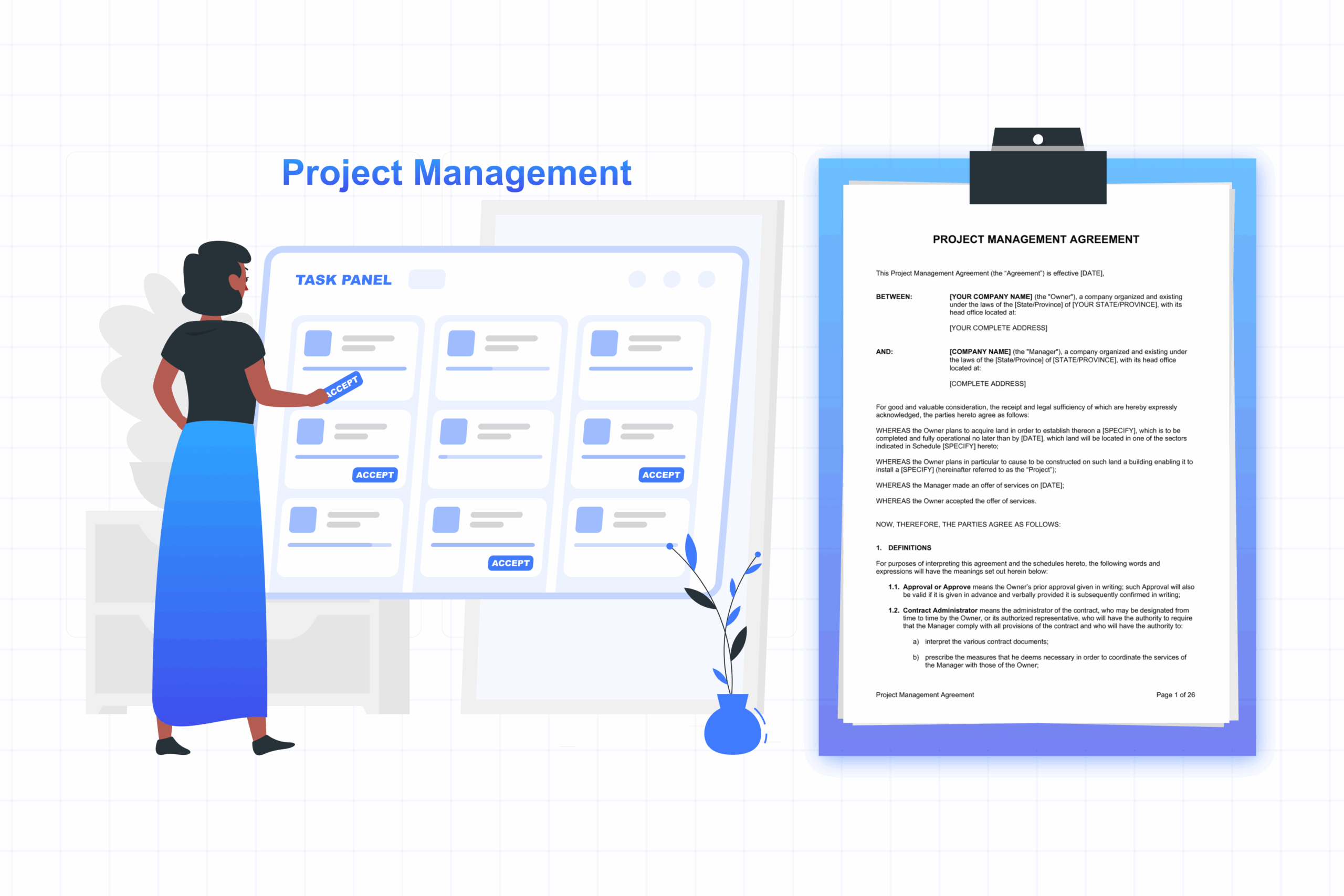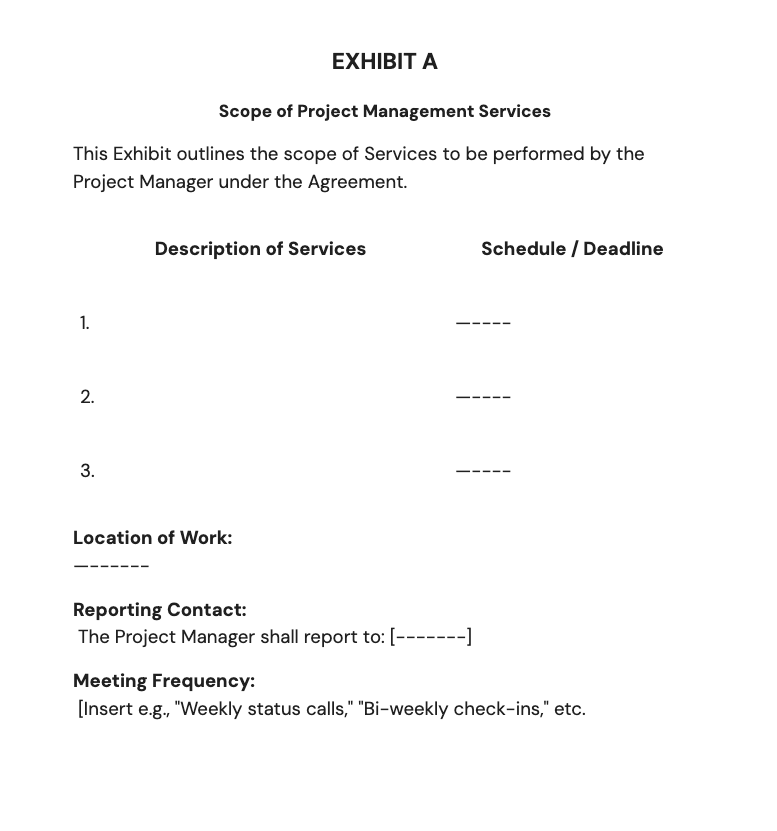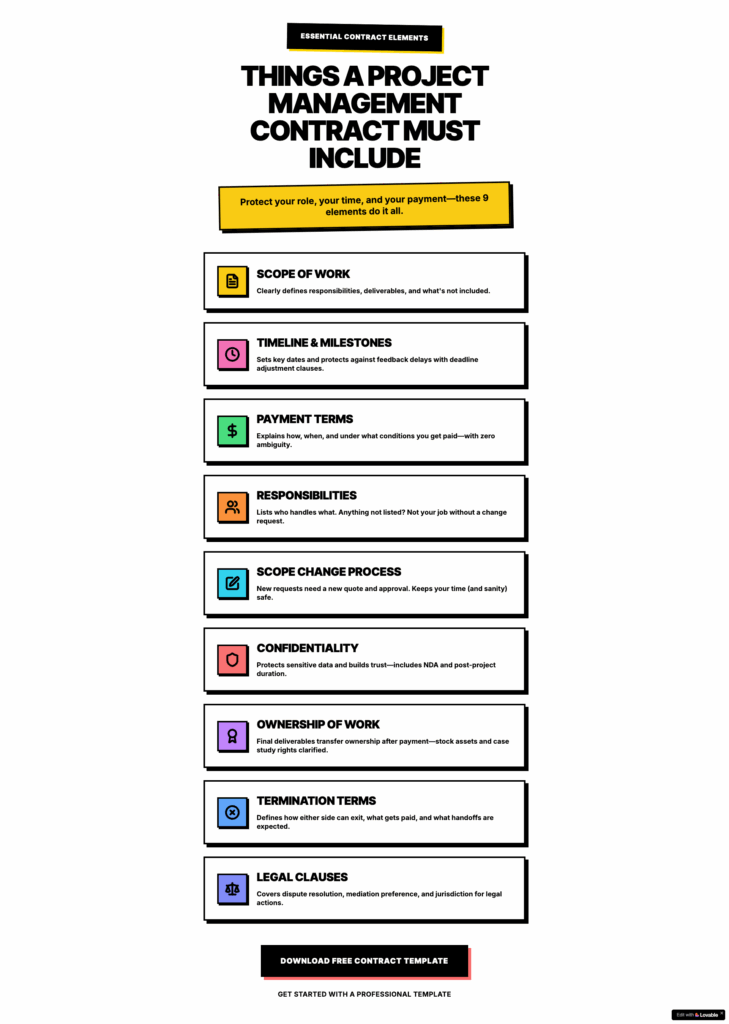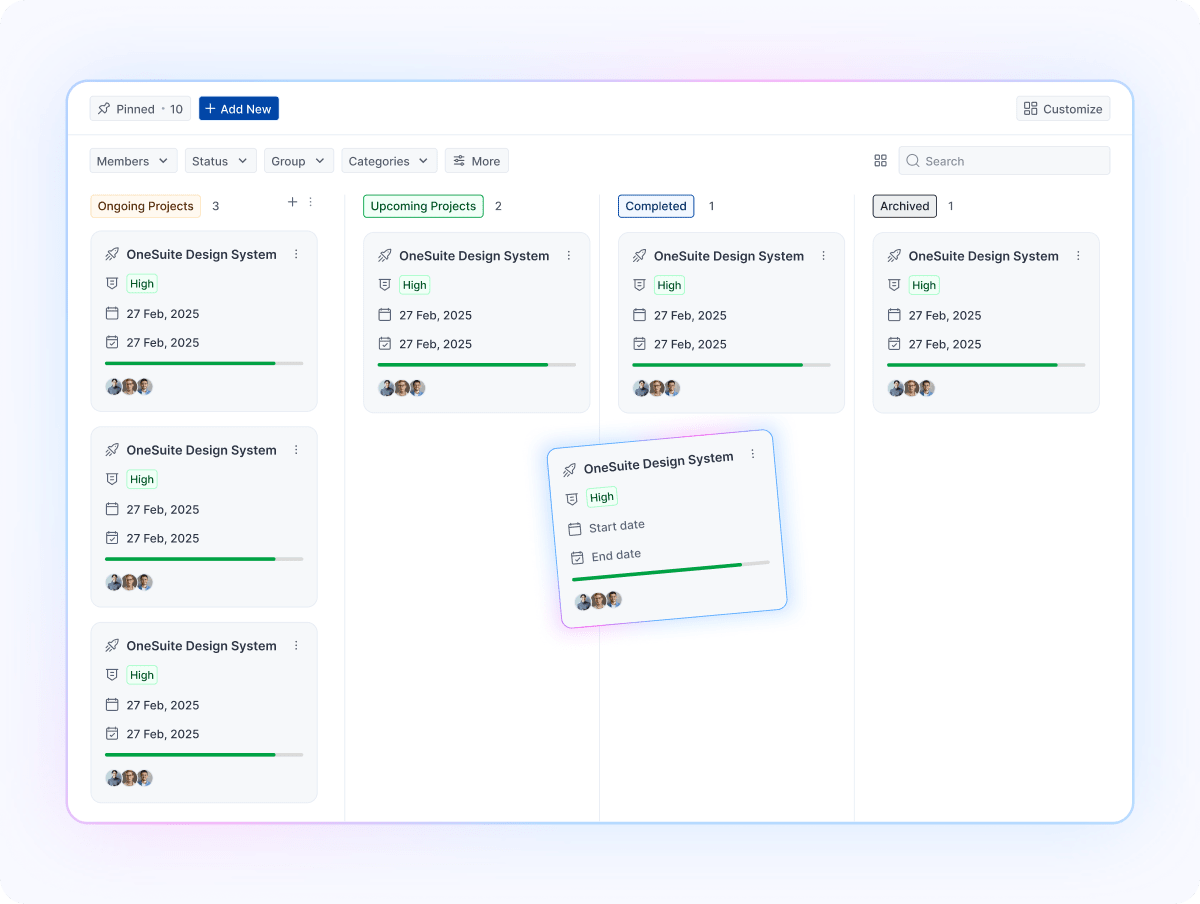
Project Management Contract Template ( What to Include & Free Download )
Every project manager has felt it, that moment when a client says, “I thought that was included,” or a deadline shifts because someone missed a deliverable. It’s not chaos. It’s just a missing contract.
Over the past few months, I’ve reviewed dozens of project scopes, remote team handoffs and agency-client agreements. And one thing keeps coming up: most PMs know they need a contract, but few actually have one that’s clear, editable and built for real-world use.
So we built one.
This Project Management Contract Template is the exact tool I wish every PM had on day one. It’s built for freelancers, agencies, in-house leads , anyone running deliverables, timelines and expectations like a business. You can edit it in minutes, send it digitally with Onesuite, and finally stop scope creep before it starts.
In this post, I’ll walk you through exactly what’s inside the template, how to customize it, and why it protects your time, authority, and payment, without slowing your process down.
Let’s dig in.👇
Get Your Free Project Management Contract Template
Fill out the form below to instantly access your free, fully customizable Project Management Contract Template. Perfect for freelancers, agencies, or in-house project managers looking to stay protected and professional.
How to Customize This Project Management Contract Template (Step-by-Step)
Let’s be real , contracts can feel overwhelming. But this one’s different.
This project management contract is designed to protect both you and your client , without all the confusing legal fluff. It’s simple, professional, and most importantly, easy to customize in just a few minutes.
To make things even easier, we’ve color-coded the fields that need your attention:
1. Fill in the highlighted sections
Swap out all the [brackets] with real information.
🟨 As the Project Manager, you’ll enter:
- Your business name, email, and contact info
- Project details: name, start date, location, and timeline
- Scope of services in Exhibit A
- Payment terms in Exhibit B (hourly rate, milestones, equity, etc.)
- Reporting frequency and communication methods
- Your name and signature at the bottom
🟩 The Client should review:
- Their company details and contact person
- Approval of the scope, timeline, and compensation
- Signature and date confirming agreement
2. Finalize the Exhibits (A & B)
This is where the real project meat lives.
Exhibit A – Scope of Work
List deliverables, meeting schedules, deadlines, and reporting contact.
Exhibit B – Compensation
Select how you’ll be paid: per hour, milestone, or flat rate. Add any expense reimbursement terms or stock options (if applicable).
3. Confirm with your client
Double-check the full agreement with your client. Go over:
- Tasks, timeline, and responsibilities
- Payment terms and deadlines
- Any clauses around non-solicitation, IP rights, or ownership
This quick review saves headaches later.
4. Clean it up and get it signed
Remove the 🟨 and 🟩 highlights after everything’s been filled out. Then:
- Export as a PDF
- Use Onesuite or your preferred tool for digital signing
- Store a signed copy for both parties
Done! Your project is now backed by a professional agreement that keeps things clear, fair and legally sound.
Most platforms offer a free trial – perfect if you’re just starting.
👉 We’ve got a short demo showing how to customize and send your contract using Onesuite in under 3 minutes.
⚡️ See Also: How to Write a Contract Agreement: A Simple Step-by-Step Guide
What is project management Contract Agreement and Why is this Important for project manager?
In project management, a contract isn’t just paperwork, it’s your project’s control system.
A project management contract is a formal agreement between the project manager, client, and often suppliers or subcontractors. It outlines the scope of work, responsibilities, payment terms, timelines and legal safeguards. Most importantly, it defines what happens if something goes off track, so you’re not left sorting out confusion after the fact.
If you’re working in fast-moving environments, dealing with vendors, or handling contract project work or project management contract jobs remote, a contract becomes even more critical. It protects your role, your time, and your delivery.
— Unless you want to risk your job, time, or payment
- It protects your role: No assumptions, no blurred lines, you control what you’re responsible for and nothing more.
- It sets project boundaries: The contract defines what’s included (and not), keeping scope creep out of your inbox.
- It guarantees payment clarity: You get to decide how and when you get paid, with leverage if things stall.
- It gives you authority during chaos: When delays or disputes come up, the contract becomes the rulebook, not guesswork.
- It builds professional respect: Clients take you more seriously when you lead with a contract. No exceptions.

What to Include in a Project Management Contract
Based on what actually happens on real projects (not what the textbooks say)
A project management contract isn’t a fancy PDF you toss in a client’s inbox and hope they sign. It’s a working tool. A real-time reference that keeps everyone accountable, from kickoff to sign-off.
Here’s exactly what we include in our contracts, and why it works:

Scope of Work
The scope of work is where every solid project manager contract begins. This section defines the tasks, deliverables and responsibilities expected from both sides.
If you’re the project manager, this is where you clearly outline what you’ll handle, whether it’s scheduling vendor coordination or delivery tracking and what’s outside of your responsibility. It’s also important to specify the client’s obligations, such as providing assets, feedback, or approvals.
For anyone managing contract project work, especially in remote roles, setting these boundaries in writing helps prevent misunderstanding, last-minute surprises, or assumptions that lead to unpaid work. This section isn’t just formal, it becomes your go-to reference when the project scope starts to blur midstream.
2. Timeline & Milestones
This section transforms your project management plan from theory to real-world execution. You’re not just listing start and end dates, you’re creating a roadmap with defined phases, milestones and delivery targets
A well-written contract should include when work begins, when key check-ins will happen and when final delivery is expected.
If the project relies on client input, we include one essential line: “Delays in client feedback will result in adjusted delivery dates.” That sentence has saved us more times than we can count.
In project management contract jobs remote, where real-time communication isn’t always possible, this clause protects your schedule from being derailed by silence. The goal here is to keep expectations realistic, and timelines respected.
3. Payment Terms
We’ve seen enough projects fall apart over unclear payment terms to know this section needs zero ambiguity. Your project manager contract should clearly explain how much you’ll be paid, when and under what conditions.
Whether you’re charging hourly, per milestone, the contract should also state how invoices are handled, what the payment deadlines are and what happens if those deadlines are missed.
In remote or freelance project management contract jobs, where consistent communication isn’t guaranteed, these terms ensure you’re not chasing payments while multipule deliverables.
4. Responsibilities
This is where the finger-pointing stops before it starts. A smart project manager contract lists who handles what, managing vendors, providing content, approving milestones. If it’s not spelled out here, someone’s going to assume it’s your job.
To avoid that, we include this line: “Any tasks not listed here are considered out-of-scope and require a change request.” It’s clean, protects your bandwidth and works especially well for remote contract project work where boundaries are everything.
5. Scope Change Process
Scope always changes, it’s how you manage it that counts. This section makes it clear: new requests mean a new quote and written approval before any extra work begins. We don’t start a thing without it
This protects both your time and pricing structure, especially on project management contract jobs remote, where “quick additions” can stack up fast. We also recommend using a change request form, it shows you’re organized and running this like a real business.
6. Confidentiality
If you’re dealing with client data, business strategies confidentiality need to be locked in. This clause defines what’s private, how it’s handled and how long it’s protected, typically 12 to 24 months post-project. It’s a must-have for any serious project management plan.
For sensitive or enterprise work, attach a Mutual NDA to keep legal teams happy and build immediate trust. It’s a small step that carries a lot of weight.
7. Ownership of Work
After final payment, the client owns the finished product simple as that. But we make one thing clear: if the work includes stock assets, licensed software, the client gets rights to the final output, not the raw tools behind it.
If we plan to show the work in a portfolio or case study, that gets its own sentence too. This section avoids confusion and protects both sides especially in project manager contracts where intellectual property can get murky.
8. Termination Terms
Projects get paused. Budgets get pulled. We plan for that. The contract includes a 7–14 day written notice period for either party to walk away. If the client cancels early, they pay for what’s been completed.
If we exit, we hand over all finished deliverables. In high-stakes projects, we may add a kill fee, especially if cancellation happens just before launch. It’s not about being difficult, it’s about not losing work that’s already done.
9. Legal Clauses (Disputes & Jurisdiction)
If something goes wrong, we aim for mediation before anything legal. It’s faster, cheaper and usually more productive. But we also state where any formal legal action would take place, typically where our business is registered.
This keeps both sides grounded and avoids arguments later. For anyone working project management contract jobs remote, especially across borders, this clause can save a lot of time.
Read also: The best project management software for managing digital agency! These 8 software options simplify the work process for your agency.
Create a Free Digital Marketing Contract with Onesuite
Creating a Free Project Management contract Template in OneSuite Easy Signing is quick and hassle-free. Start by clearly outlining all services, deliverables and payment terms. You can either upload your finalized contract as a Docs file or use OneSuite’s editor to create it directly within the platform.
Here’s how to get started:
Upload to OneSuite – Go to the Documents section and upload your contract.
Write Your Contract – Use OneSuite’s editor to create a clear contract outlining your services, deliverables and payment terms.
Add Signature Fields – Add fields for both you and your client to sign and date the contract.
Link to Client Profile – Attach the contract to the client’s profile for easy tracking.
Send for Signature – Send the contract to your client via a secure link for signing.
Lock Contract Automatically – Once signed, the contract will be locked automatically, providing a legally verified document.
Save as a Template – Save the contract as a reusable template for future projects.
Ready to streamline your contract process? Create your free Project Management Contract today with OneSuite! Save time, eliminate paperwork hassles and ensure smooth client projects.
-write the same for project management contract template. and more better not listicle
𝌋 Access more professional templates :
Find a Better Way to Grow
OneSuite streamlines projects, clients, and payments in one place, making growth hassle-free.



